Exploring the Impact of Social Media on the #BlackLivesMatter Movement
VerifiedAdded on 2022/08/18
|12
|3740
|15
Essay
AI Summary
This essay investigates the profound impact of social media on the #BlackLivesMatter movement, examining how platforms like Twitter and Facebook have fueled its growth and influence. The paper explores the movement's origins following the Trayvon Martin case and the role of key figures in leveraging social media through hashtags like #BlackLivesMatter. It analyzes how social media facilitates mobilization, connection-building, and the dissemination of alternative narratives, while also addressing potential risks and challenges. The essay highlights the movement's expansion against racial violence, its use of direct action, and its global impact, including protests in the UK, Canada, and Australia. Furthermore, it discusses the use of memes, ICTs, and surveys to gauge public opinion and engagement, presenting a comprehensive overview of social media's pivotal role in the BLM movement's evolution and impact on societal discourse and activism.
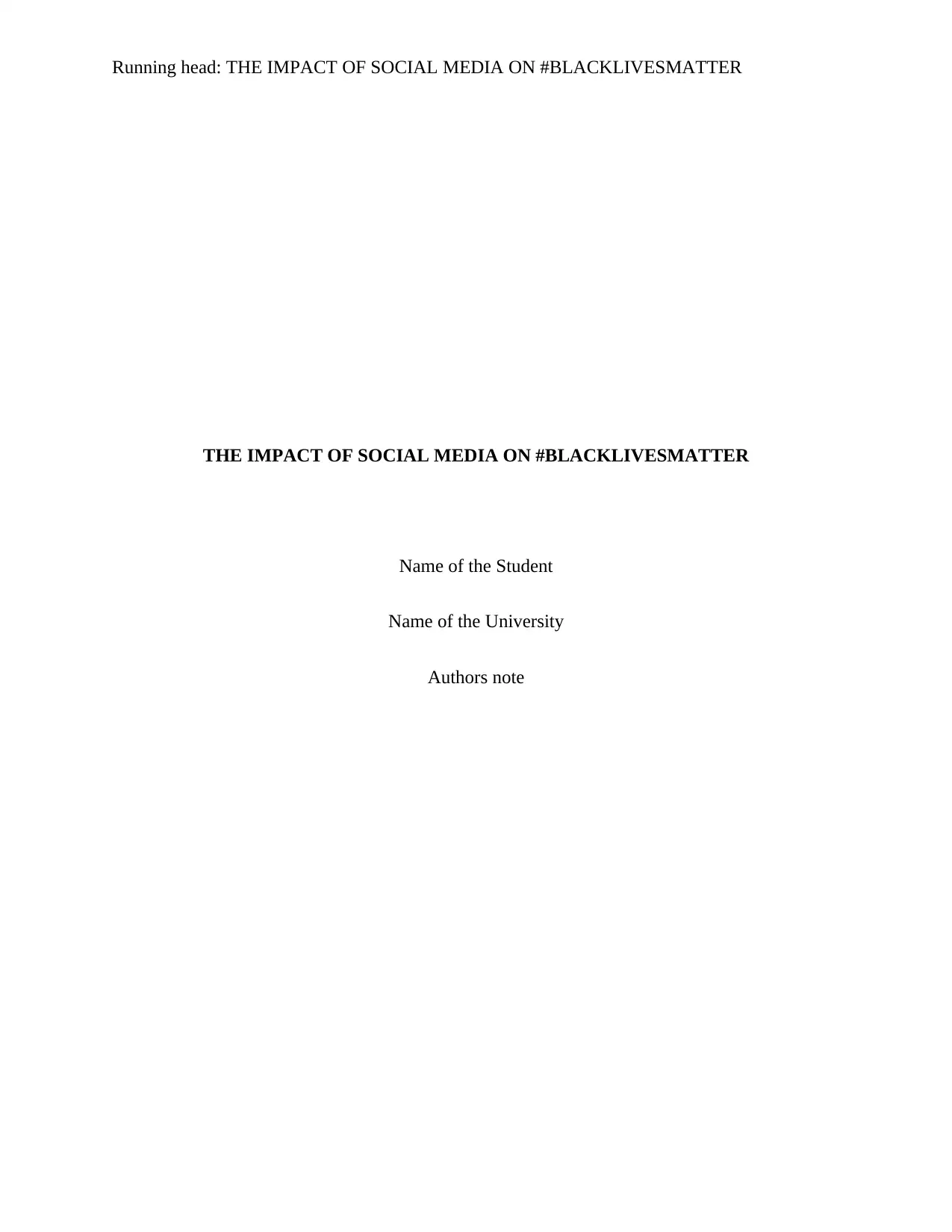
Running head: THE IMPACT OF SOCIAL MEDIA ON #BLACKLIVESMATTER
THE IMPACT OF SOCIAL MEDIA ON #BLACKLIVESMATTER
Name of the Student
Name of the University
Authors note
THE IMPACT OF SOCIAL MEDIA ON #BLACKLIVESMATTER
Name of the Student
Name of the University
Authors note
Paraphrase This Document
Need a fresh take? Get an instant paraphrase of this document with our AI Paraphraser
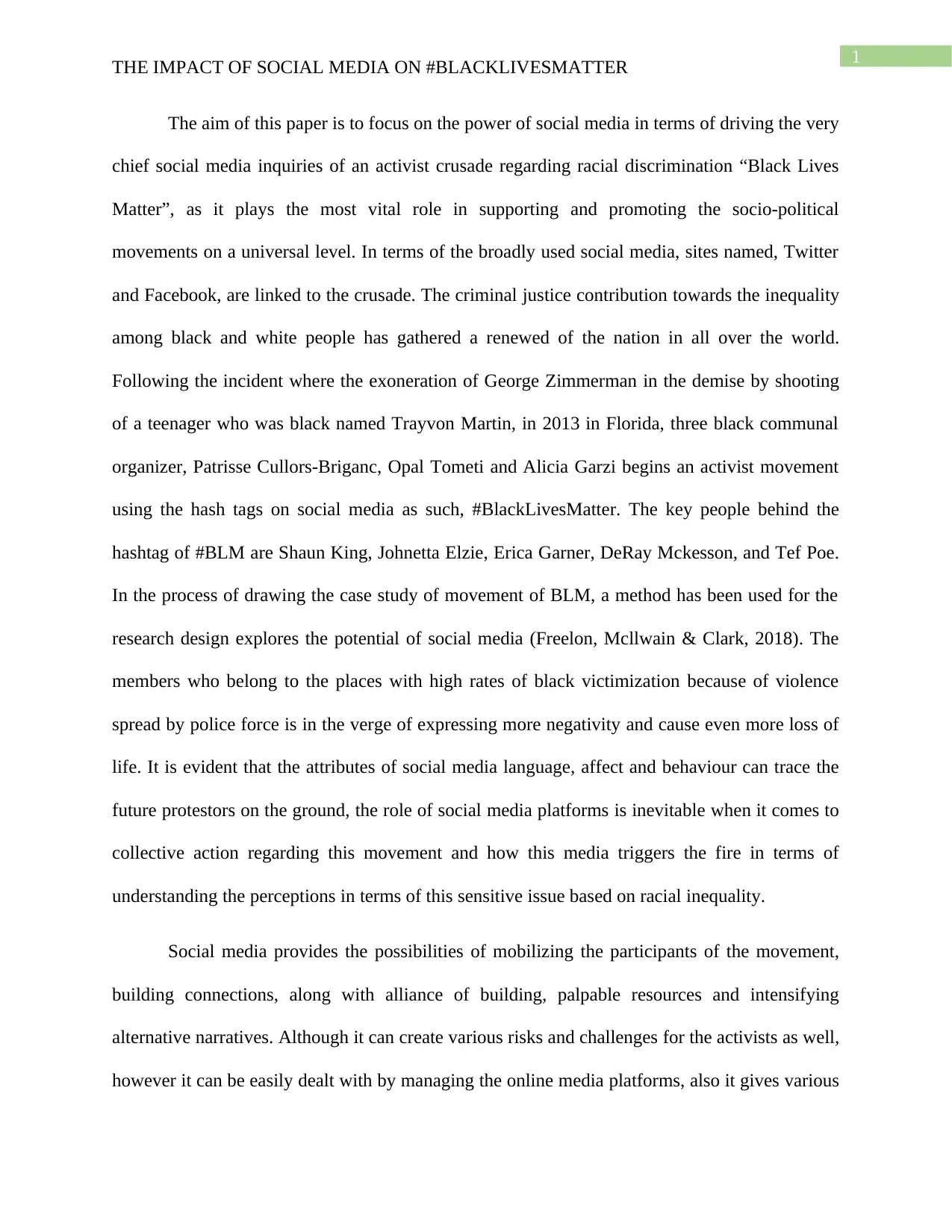
1
THE IMPACT OF SOCIAL MEDIA ON #BLACKLIVESMATTER
The aim of this paper is to focus on the power of social media in terms of driving the very
chief social media inquiries of an activist crusade regarding racial discrimination “Black Lives
Matter”, as it plays the most vital role in supporting and promoting the socio-political
movements on a universal level. In terms of the broadly used social media, sites named, Twitter
and Facebook, are linked to the crusade. The criminal justice contribution towards the inequality
among black and white people has gathered a renewed of the nation in all over the world.
Following the incident where the exoneration of George Zimmerman in the demise by shooting
of a teenager who was black named Trayvon Martin, in 2013 in Florida, three black communal
organizer, Patrisse Cullors-Briganc, Opal Tometi and Alicia Garzi begins an activist movement
using the hash tags on social media as such, #BlackLivesMatter. The key people behind the
hashtag of #BLM are Shaun King, Johnetta Elzie, Erica Garner, DeRay Mckesson, and Tef Poe.
In the process of drawing the case study of movement of BLM, a method has been used for the
research design explores the potential of social media (Freelon, Mcllwain & Clark, 2018). The
members who belong to the places with high rates of black victimization because of violence
spread by police force is in the verge of expressing more negativity and cause even more loss of
life. It is evident that the attributes of social media language, affect and behaviour can trace the
future protestors on the ground, the role of social media platforms is inevitable when it comes to
collective action regarding this movement and how this media triggers the fire in terms of
understanding the perceptions in terms of this sensitive issue based on racial inequality.
Social media provides the possibilities of mobilizing the participants of the movement,
building connections, along with alliance of building, palpable resources and intensifying
alternative narratives. Although it can create various risks and challenges for the activists as well,
however it can be easily dealt with by managing the online media platforms, also it gives various
THE IMPACT OF SOCIAL MEDIA ON #BLACKLIVESMATTER
The aim of this paper is to focus on the power of social media in terms of driving the very
chief social media inquiries of an activist crusade regarding racial discrimination “Black Lives
Matter”, as it plays the most vital role in supporting and promoting the socio-political
movements on a universal level. In terms of the broadly used social media, sites named, Twitter
and Facebook, are linked to the crusade. The criminal justice contribution towards the inequality
among black and white people has gathered a renewed of the nation in all over the world.
Following the incident where the exoneration of George Zimmerman in the demise by shooting
of a teenager who was black named Trayvon Martin, in 2013 in Florida, three black communal
organizer, Patrisse Cullors-Briganc, Opal Tometi and Alicia Garzi begins an activist movement
using the hash tags on social media as such, #BlackLivesMatter. The key people behind the
hashtag of #BLM are Shaun King, Johnetta Elzie, Erica Garner, DeRay Mckesson, and Tef Poe.
In the process of drawing the case study of movement of BLM, a method has been used for the
research design explores the potential of social media (Freelon, Mcllwain & Clark, 2018). The
members who belong to the places with high rates of black victimization because of violence
spread by police force is in the verge of expressing more negativity and cause even more loss of
life. It is evident that the attributes of social media language, affect and behaviour can trace the
future protestors on the ground, the role of social media platforms is inevitable when it comes to
collective action regarding this movement and how this media triggers the fire in terms of
understanding the perceptions in terms of this sensitive issue based on racial inequality.
Social media provides the possibilities of mobilizing the participants of the movement,
building connections, along with alliance of building, palpable resources and intensifying
alternative narratives. Although it can create various risks and challenges for the activists as well,
however it can be easily dealt with by managing the online media platforms, also it gives various
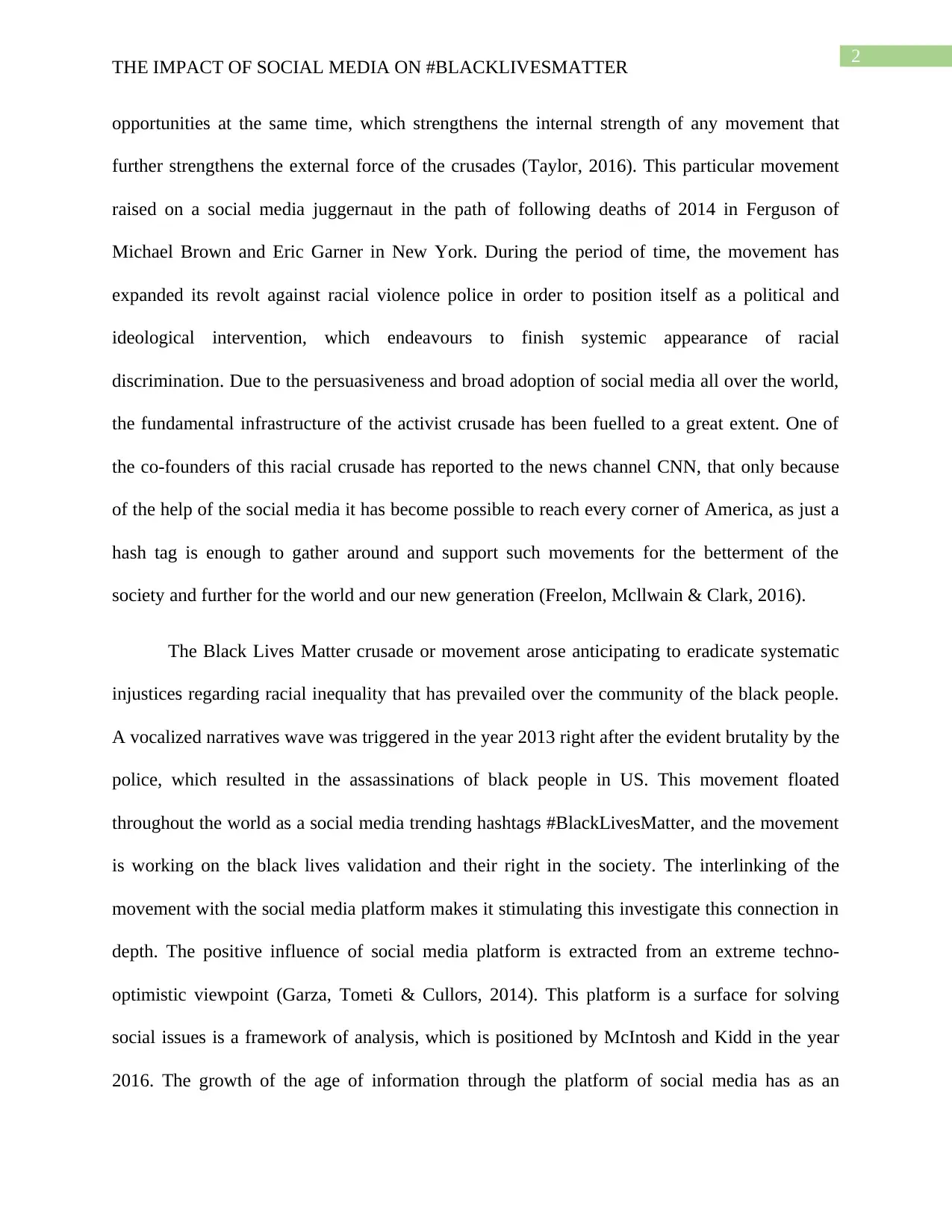
2
THE IMPACT OF SOCIAL MEDIA ON #BLACKLIVESMATTER
opportunities at the same time, which strengthens the internal strength of any movement that
further strengthens the external force of the crusades (Taylor, 2016). This particular movement
raised on a social media juggernaut in the path of following deaths of 2014 in Ferguson of
Michael Brown and Eric Garner in New York. During the period of time, the movement has
expanded its revolt against racial violence police in order to position itself as a political and
ideological intervention, which endeavours to finish systemic appearance of racial
discrimination. Due to the persuasiveness and broad adoption of social media all over the world,
the fundamental infrastructure of the activist crusade has been fuelled to a great extent. One of
the co-founders of this racial crusade has reported to the news channel CNN, that only because
of the help of the social media it has become possible to reach every corner of America, as just a
hash tag is enough to gather around and support such movements for the betterment of the
society and further for the world and our new generation (Freelon, Mcllwain & Clark, 2016).
The Black Lives Matter crusade or movement arose anticipating to eradicate systematic
injustices regarding racial inequality that has prevailed over the community of the black people.
A vocalized narratives wave was triggered in the year 2013 right after the evident brutality by the
police, which resulted in the assassinations of black people in US. This movement floated
throughout the world as a social media trending hashtags #BlackLivesMatter, and the movement
is working on the black lives validation and their right in the society. The interlinking of the
movement with the social media platform makes it stimulating this investigate this connection in
depth. The positive influence of social media platform is extracted from an extreme techno-
optimistic viewpoint (Garza, Tometi & Cullors, 2014). This platform is a surface for solving
social issues is a framework of analysis, which is positioned by McIntosh and Kidd in the year
2016. The growth of the age of information through the platform of social media has as an
THE IMPACT OF SOCIAL MEDIA ON #BLACKLIVESMATTER
opportunities at the same time, which strengthens the internal strength of any movement that
further strengthens the external force of the crusades (Taylor, 2016). This particular movement
raised on a social media juggernaut in the path of following deaths of 2014 in Ferguson of
Michael Brown and Eric Garner in New York. During the period of time, the movement has
expanded its revolt against racial violence police in order to position itself as a political and
ideological intervention, which endeavours to finish systemic appearance of racial
discrimination. Due to the persuasiveness and broad adoption of social media all over the world,
the fundamental infrastructure of the activist crusade has been fuelled to a great extent. One of
the co-founders of this racial crusade has reported to the news channel CNN, that only because
of the help of the social media it has become possible to reach every corner of America, as just a
hash tag is enough to gather around and support such movements for the betterment of the
society and further for the world and our new generation (Freelon, Mcllwain & Clark, 2016).
The Black Lives Matter crusade or movement arose anticipating to eradicate systematic
injustices regarding racial inequality that has prevailed over the community of the black people.
A vocalized narratives wave was triggered in the year 2013 right after the evident brutality by the
police, which resulted in the assassinations of black people in US. This movement floated
throughout the world as a social media trending hashtags #BlackLivesMatter, and the movement
is working on the black lives validation and their right in the society. The interlinking of the
movement with the social media platform makes it stimulating this investigate this connection in
depth. The positive influence of social media platform is extracted from an extreme techno-
optimistic viewpoint (Garza, Tometi & Cullors, 2014). This platform is a surface for solving
social issues is a framework of analysis, which is positioned by McIntosh and Kidd in the year
2016. The growth of the age of information through the platform of social media has as an
⊘ This is a preview!⊘
Do you want full access?
Subscribe today to unlock all pages.

Trusted by 1+ million students worldwide
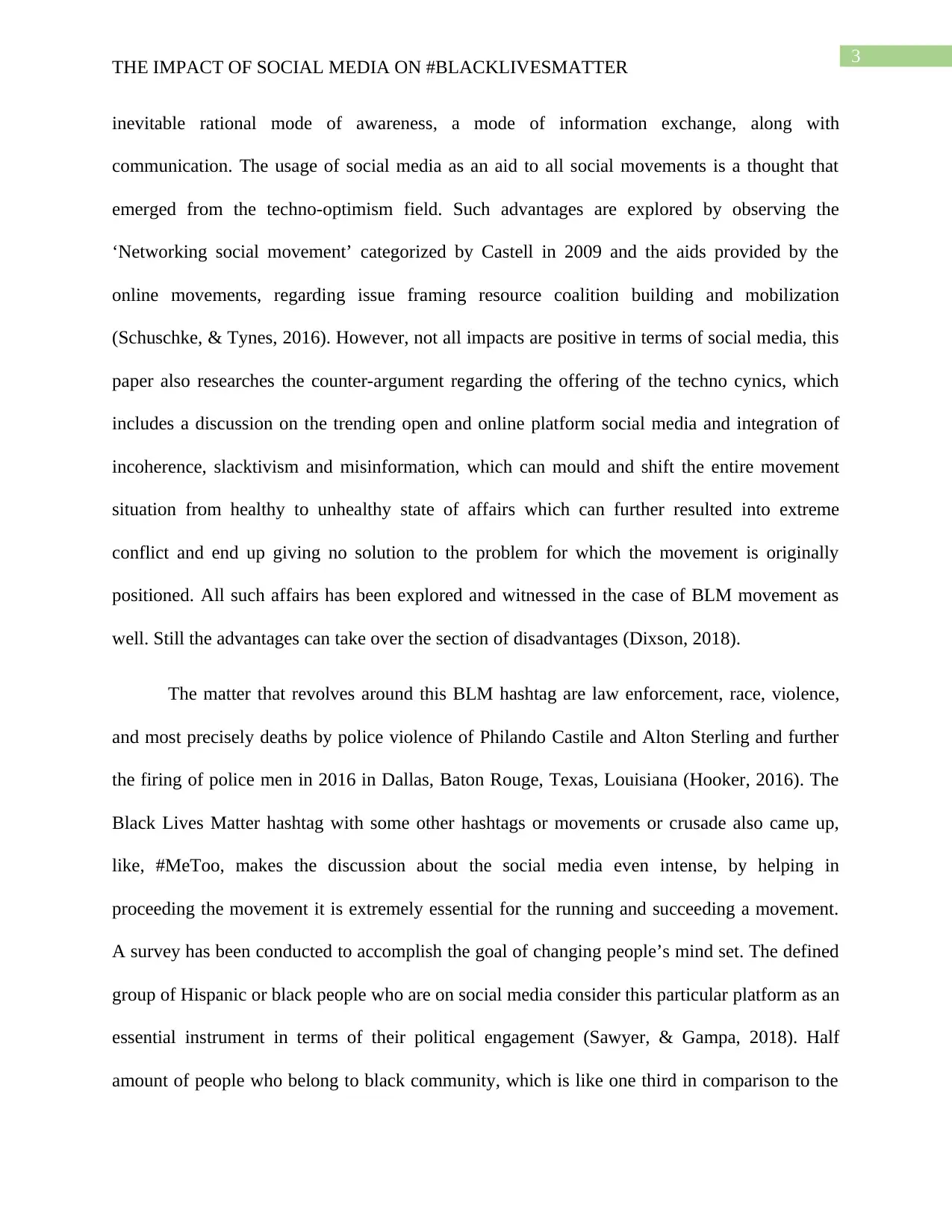
3
THE IMPACT OF SOCIAL MEDIA ON #BLACKLIVESMATTER
inevitable rational mode of awareness, a mode of information exchange, along with
communication. The usage of social media as an aid to all social movements is a thought that
emerged from the techno-optimism field. Such advantages are explored by observing the
‘Networking social movement’ categorized by Castell in 2009 and the aids provided by the
online movements, regarding issue framing resource coalition building and mobilization
(Schuschke, & Tynes, 2016). However, not all impacts are positive in terms of social media, this
paper also researches the counter-argument regarding the offering of the techno cynics, which
includes a discussion on the trending open and online platform social media and integration of
incoherence, slacktivism and misinformation, which can mould and shift the entire movement
situation from healthy to unhealthy state of affairs which can further resulted into extreme
conflict and end up giving no solution to the problem for which the movement is originally
positioned. All such affairs has been explored and witnessed in the case of BLM movement as
well. Still the advantages can take over the section of disadvantages (Dixson, 2018).
The matter that revolves around this BLM hashtag are law enforcement, race, violence,
and most precisely deaths by police violence of Philando Castile and Alton Sterling and further
the firing of police men in 2016 in Dallas, Baton Rouge, Texas, Louisiana (Hooker, 2016). The
Black Lives Matter hashtag with some other hashtags or movements or crusade also came up,
like, #MeToo, makes the discussion about the social media even intense, by helping in
proceeding the movement it is extremely essential for the running and succeeding a movement.
A survey has been conducted to accomplish the goal of changing people’s mind set. The defined
group of Hispanic or black people who are on social media consider this particular platform as an
essential instrument in terms of their political engagement (Sawyer, & Gampa, 2018). Half
amount of people who belong to black community, which is like one third in comparison to the
THE IMPACT OF SOCIAL MEDIA ON #BLACKLIVESMATTER
inevitable rational mode of awareness, a mode of information exchange, along with
communication. The usage of social media as an aid to all social movements is a thought that
emerged from the techno-optimism field. Such advantages are explored by observing the
‘Networking social movement’ categorized by Castell in 2009 and the aids provided by the
online movements, regarding issue framing resource coalition building and mobilization
(Schuschke, & Tynes, 2016). However, not all impacts are positive in terms of social media, this
paper also researches the counter-argument regarding the offering of the techno cynics, which
includes a discussion on the trending open and online platform social media and integration of
incoherence, slacktivism and misinformation, which can mould and shift the entire movement
situation from healthy to unhealthy state of affairs which can further resulted into extreme
conflict and end up giving no solution to the problem for which the movement is originally
positioned. All such affairs has been explored and witnessed in the case of BLM movement as
well. Still the advantages can take over the section of disadvantages (Dixson, 2018).
The matter that revolves around this BLM hashtag are law enforcement, race, violence,
and most precisely deaths by police violence of Philando Castile and Alton Sterling and further
the firing of police men in 2016 in Dallas, Baton Rouge, Texas, Louisiana (Hooker, 2016). The
Black Lives Matter hashtag with some other hashtags or movements or crusade also came up,
like, #MeToo, makes the discussion about the social media even intense, by helping in
proceeding the movement it is extremely essential for the running and succeeding a movement.
A survey has been conducted to accomplish the goal of changing people’s mind set. The defined
group of Hispanic or black people who are on social media consider this particular platform as an
essential instrument in terms of their political engagement (Sawyer, & Gampa, 2018). Half
amount of people who belong to black community, which is like one third in comparison to the
Paraphrase This Document
Need a fresh take? Get an instant paraphrase of this document with our AI Paraphraser
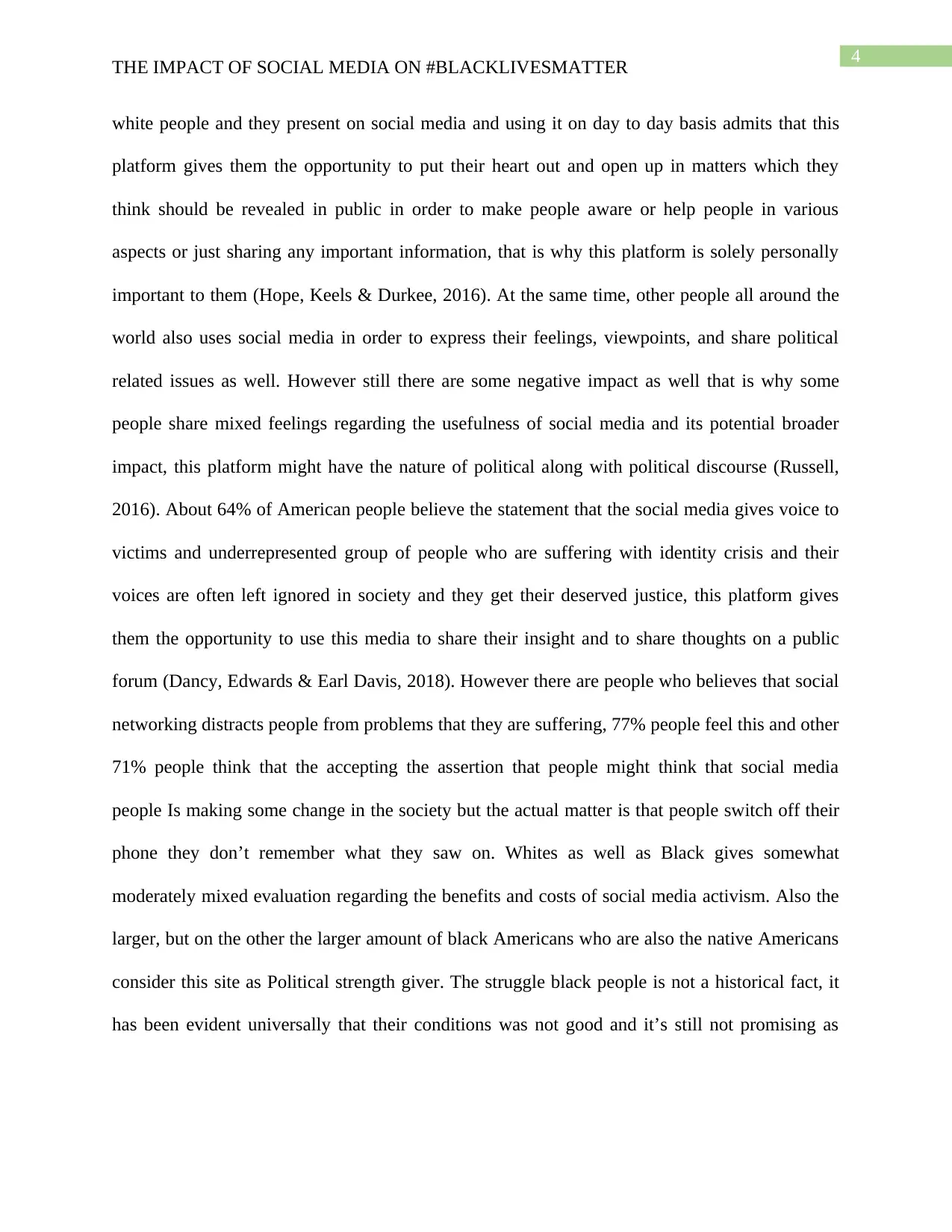
4
THE IMPACT OF SOCIAL MEDIA ON #BLACKLIVESMATTER
white people and they present on social media and using it on day to day basis admits that this
platform gives them the opportunity to put their heart out and open up in matters which they
think should be revealed in public in order to make people aware or help people in various
aspects or just sharing any important information, that is why this platform is solely personally
important to them (Hope, Keels & Durkee, 2016). At the same time, other people all around the
world also uses social media in order to express their feelings, viewpoints, and share political
related issues as well. However still there are some negative impact as well that is why some
people share mixed feelings regarding the usefulness of social media and its potential broader
impact, this platform might have the nature of political along with political discourse (Russell,
2016). About 64% of American people believe the statement that the social media gives voice to
victims and underrepresented group of people who are suffering with identity crisis and their
voices are often left ignored in society and they get their deserved justice, this platform gives
them the opportunity to use this media to share their insight and to share thoughts on a public
forum (Dancy, Edwards & Earl Davis, 2018). However there are people who believes that social
networking distracts people from problems that they are suffering, 77% people feel this and other
71% people think that the accepting the assertion that people might think that social media
people Is making some change in the society but the actual matter is that people switch off their
phone they don’t remember what they saw on. Whites as well as Black gives somewhat
moderately mixed evaluation regarding the benefits and costs of social media activism. Also the
larger, but on the other the larger amount of black Americans who are also the native Americans
consider this site as Political strength giver. The struggle black people is not a historical fact, it
has been evident universally that their conditions was not good and it’s still not promising as
THE IMPACT OF SOCIAL MEDIA ON #BLACKLIVESMATTER
white people and they present on social media and using it on day to day basis admits that this
platform gives them the opportunity to put their heart out and open up in matters which they
think should be revealed in public in order to make people aware or help people in various
aspects or just sharing any important information, that is why this platform is solely personally
important to them (Hope, Keels & Durkee, 2016). At the same time, other people all around the
world also uses social media in order to express their feelings, viewpoints, and share political
related issues as well. However still there are some negative impact as well that is why some
people share mixed feelings regarding the usefulness of social media and its potential broader
impact, this platform might have the nature of political along with political discourse (Russell,
2016). About 64% of American people believe the statement that the social media gives voice to
victims and underrepresented group of people who are suffering with identity crisis and their
voices are often left ignored in society and they get their deserved justice, this platform gives
them the opportunity to use this media to share their insight and to share thoughts on a public
forum (Dancy, Edwards & Earl Davis, 2018). However there are people who believes that social
networking distracts people from problems that they are suffering, 77% people feel this and other
71% people think that the accepting the assertion that people might think that social media
people Is making some change in the society but the actual matter is that people switch off their
phone they don’t remember what they saw on. Whites as well as Black gives somewhat
moderately mixed evaluation regarding the benefits and costs of social media activism. Also the
larger, but on the other the larger amount of black Americans who are also the native Americans
consider this site as Political strength giver. The struggle black people is not a historical fact, it
has been evident universally that their conditions was not good and it’s still not promising as
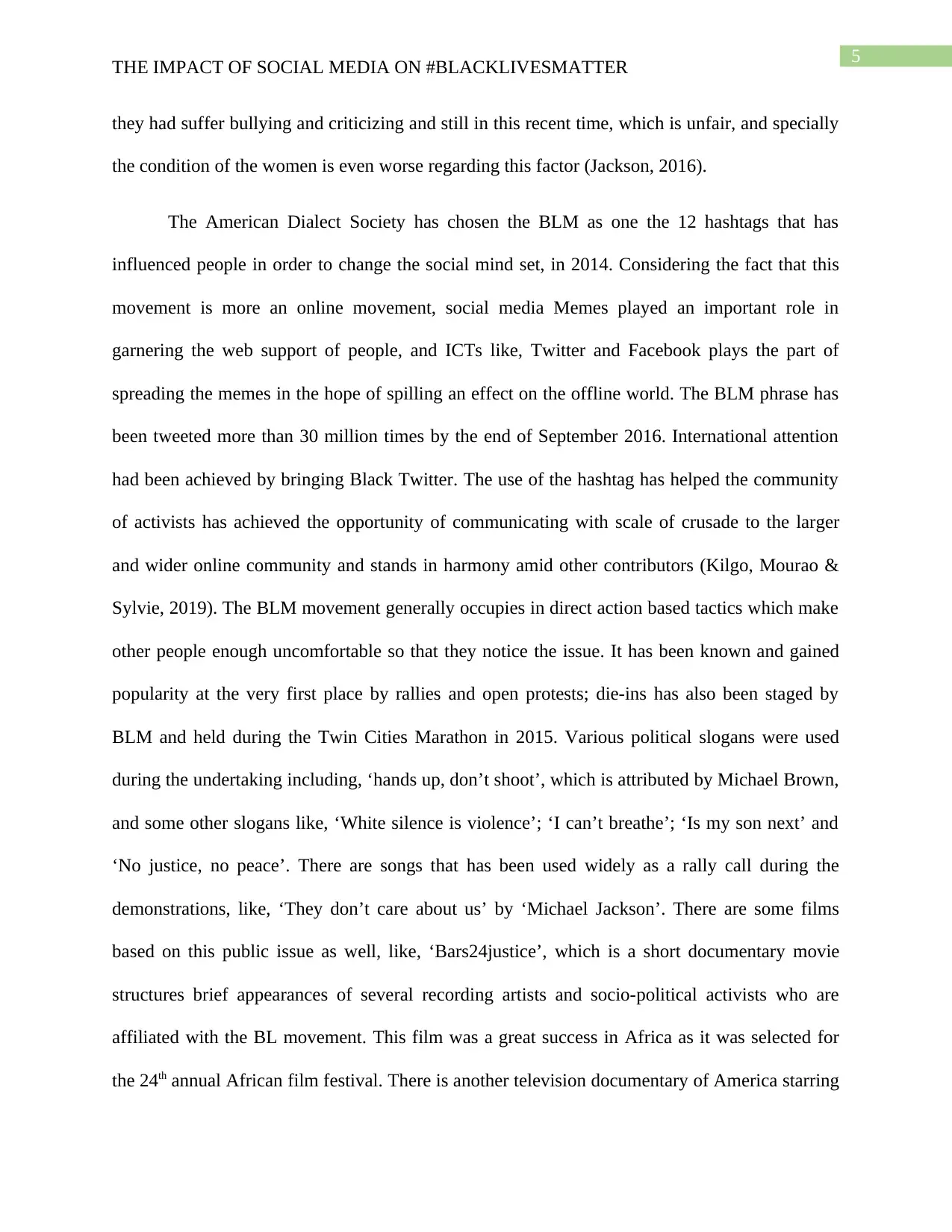
5
THE IMPACT OF SOCIAL MEDIA ON #BLACKLIVESMATTER
they had suffer bullying and criticizing and still in this recent time, which is unfair, and specially
the condition of the women is even worse regarding this factor (Jackson, 2016).
The American Dialect Society has chosen the BLM as one the 12 hashtags that has
influenced people in order to change the social mind set, in 2014. Considering the fact that this
movement is more an online movement, social media Memes played an important role in
garnering the web support of people, and ICTs like, Twitter and Facebook plays the part of
spreading the memes in the hope of spilling an effect on the offline world. The BLM phrase has
been tweeted more than 30 million times by the end of September 2016. International attention
had been achieved by bringing Black Twitter. The use of the hashtag has helped the community
of activists has achieved the opportunity of communicating with scale of crusade to the larger
and wider online community and stands in harmony amid other contributors (Kilgo, Mourao &
Sylvie, 2019). The BLM movement generally occupies in direct action based tactics which make
other people enough uncomfortable so that they notice the issue. It has been known and gained
popularity at the very first place by rallies and open protests; die-ins has also been staged by
BLM and held during the Twin Cities Marathon in 2015. Various political slogans were used
during the undertaking including, ‘hands up, don’t shoot’, which is attributed by Michael Brown,
and some other slogans like, ‘White silence is violence’; ‘I can’t breathe’; ‘Is my son next’ and
‘No justice, no peace’. There are songs that has been used widely as a rally call during the
demonstrations, like, ‘They don’t care about us’ by ‘Michael Jackson’. There are some films
based on this public issue as well, like, ‘Bars24justice’, which is a short documentary movie
structures brief appearances of several recording artists and socio-political activists who are
affiliated with the BL movement. This film was a great success in Africa as it was selected for
the 24th annual African film festival. There is another television documentary of America starring
THE IMPACT OF SOCIAL MEDIA ON #BLACKLIVESMATTER
they had suffer bullying and criticizing and still in this recent time, which is unfair, and specially
the condition of the women is even worse regarding this factor (Jackson, 2016).
The American Dialect Society has chosen the BLM as one the 12 hashtags that has
influenced people in order to change the social mind set, in 2014. Considering the fact that this
movement is more an online movement, social media Memes played an important role in
garnering the web support of people, and ICTs like, Twitter and Facebook plays the part of
spreading the memes in the hope of spilling an effect on the offline world. The BLM phrase has
been tweeted more than 30 million times by the end of September 2016. International attention
had been achieved by bringing Black Twitter. The use of the hashtag has helped the community
of activists has achieved the opportunity of communicating with scale of crusade to the larger
and wider online community and stands in harmony amid other contributors (Kilgo, Mourao &
Sylvie, 2019). The BLM movement generally occupies in direct action based tactics which make
other people enough uncomfortable so that they notice the issue. It has been known and gained
popularity at the very first place by rallies and open protests; die-ins has also been staged by
BLM and held during the Twin Cities Marathon in 2015. Various political slogans were used
during the undertaking including, ‘hands up, don’t shoot’, which is attributed by Michael Brown,
and some other slogans like, ‘White silence is violence’; ‘I can’t breathe’; ‘Is my son next’ and
‘No justice, no peace’. There are songs that has been used widely as a rally call during the
demonstrations, like, ‘They don’t care about us’ by ‘Michael Jackson’. There are some films
based on this public issue as well, like, ‘Bars24justice’, which is a short documentary movie
structures brief appearances of several recording artists and socio-political activists who are
affiliated with the BL movement. This film was a great success in Africa as it was selected for
the 24th annual African film festival. There is another television documentary of America starring
⊘ This is a preview!⊘
Do you want full access?
Subscribe today to unlock all pages.

Trusted by 1+ million students worldwide
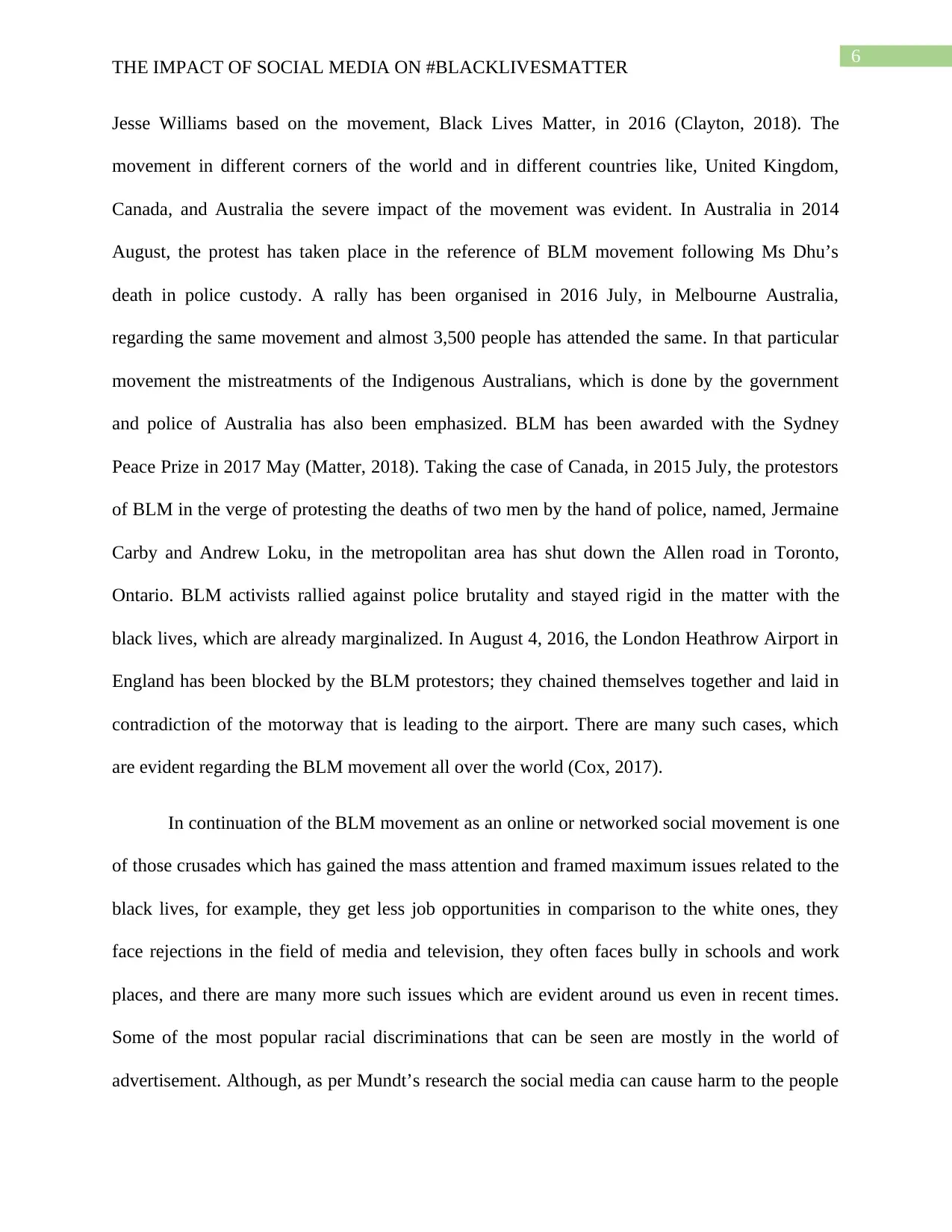
6
THE IMPACT OF SOCIAL MEDIA ON #BLACKLIVESMATTER
Jesse Williams based on the movement, Black Lives Matter, in 2016 (Clayton, 2018). The
movement in different corners of the world and in different countries like, United Kingdom,
Canada, and Australia the severe impact of the movement was evident. In Australia in 2014
August, the protest has taken place in the reference of BLM movement following Ms Dhu’s
death in police custody. A rally has been organised in 2016 July, in Melbourne Australia,
regarding the same movement and almost 3,500 people has attended the same. In that particular
movement the mistreatments of the Indigenous Australians, which is done by the government
and police of Australia has also been emphasized. BLM has been awarded with the Sydney
Peace Prize in 2017 May (Matter, 2018). Taking the case of Canada, in 2015 July, the protestors
of BLM in the verge of protesting the deaths of two men by the hand of police, named, Jermaine
Carby and Andrew Loku, in the metropolitan area has shut down the Allen road in Toronto,
Ontario. BLM activists rallied against police brutality and stayed rigid in the matter with the
black lives, which are already marginalized. In August 4, 2016, the London Heathrow Airport in
England has been blocked by the BLM protestors; they chained themselves together and laid in
contradiction of the motorway that is leading to the airport. There are many such cases, which
are evident regarding the BLM movement all over the world (Cox, 2017).
In continuation of the BLM movement as an online or networked social movement is one
of those crusades which has gained the mass attention and framed maximum issues related to the
black lives, for example, they get less job opportunities in comparison to the white ones, they
face rejections in the field of media and television, they often faces bully in schools and work
places, and there are many more such issues which are evident around us even in recent times.
Some of the most popular racial discriminations that can be seen are mostly in the world of
advertisement. Although, as per Mundt’s research the social media can cause harm to the people
THE IMPACT OF SOCIAL MEDIA ON #BLACKLIVESMATTER
Jesse Williams based on the movement, Black Lives Matter, in 2016 (Clayton, 2018). The
movement in different corners of the world and in different countries like, United Kingdom,
Canada, and Australia the severe impact of the movement was evident. In Australia in 2014
August, the protest has taken place in the reference of BLM movement following Ms Dhu’s
death in police custody. A rally has been organised in 2016 July, in Melbourne Australia,
regarding the same movement and almost 3,500 people has attended the same. In that particular
movement the mistreatments of the Indigenous Australians, which is done by the government
and police of Australia has also been emphasized. BLM has been awarded with the Sydney
Peace Prize in 2017 May (Matter, 2018). Taking the case of Canada, in 2015 July, the protestors
of BLM in the verge of protesting the deaths of two men by the hand of police, named, Jermaine
Carby and Andrew Loku, in the metropolitan area has shut down the Allen road in Toronto,
Ontario. BLM activists rallied against police brutality and stayed rigid in the matter with the
black lives, which are already marginalized. In August 4, 2016, the London Heathrow Airport in
England has been blocked by the BLM protestors; they chained themselves together and laid in
contradiction of the motorway that is leading to the airport. There are many such cases, which
are evident regarding the BLM movement all over the world (Cox, 2017).
In continuation of the BLM movement as an online or networked social movement is one
of those crusades which has gained the mass attention and framed maximum issues related to the
black lives, for example, they get less job opportunities in comparison to the white ones, they
face rejections in the field of media and television, they often faces bully in schools and work
places, and there are many more such issues which are evident around us even in recent times.
Some of the most popular racial discriminations that can be seen are mostly in the world of
advertisement. Although, as per Mundt’s research the social media can cause harm to the people
Paraphrase This Document
Need a fresh take? Get an instant paraphrase of this document with our AI Paraphraser
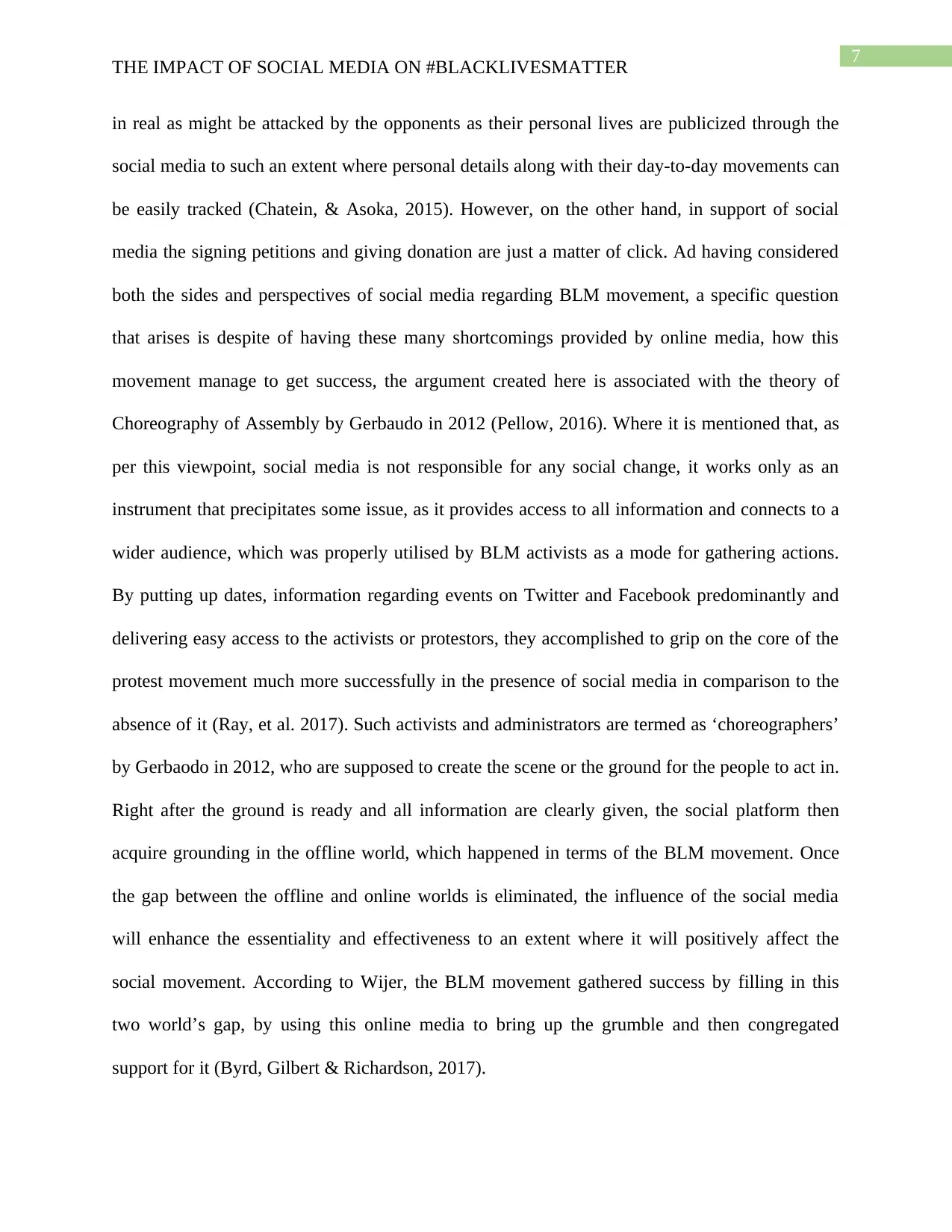
7
THE IMPACT OF SOCIAL MEDIA ON #BLACKLIVESMATTER
in real as might be attacked by the opponents as their personal lives are publicized through the
social media to such an extent where personal details along with their day-to-day movements can
be easily tracked (Chatein, & Asoka, 2015). However, on the other hand, in support of social
media the signing petitions and giving donation are just a matter of click. Ad having considered
both the sides and perspectives of social media regarding BLM movement, a specific question
that arises is despite of having these many shortcomings provided by online media, how this
movement manage to get success, the argument created here is associated with the theory of
Choreography of Assembly by Gerbaudo in 2012 (Pellow, 2016). Where it is mentioned that, as
per this viewpoint, social media is not responsible for any social change, it works only as an
instrument that precipitates some issue, as it provides access to all information and connects to a
wider audience, which was properly utilised by BLM activists as a mode for gathering actions.
By putting up dates, information regarding events on Twitter and Facebook predominantly and
delivering easy access to the activists or protestors, they accomplished to grip on the core of the
protest movement much more successfully in the presence of social media in comparison to the
absence of it (Ray, et al. 2017). Such activists and administrators are termed as ‘choreographers’
by Gerbaodo in 2012, who are supposed to create the scene or the ground for the people to act in.
Right after the ground is ready and all information are clearly given, the social platform then
acquire grounding in the offline world, which happened in terms of the BLM movement. Once
the gap between the offline and online worlds is eliminated, the influence of the social media
will enhance the essentiality and effectiveness to an extent where it will positively affect the
social movement. According to Wijer, the BLM movement gathered success by filling in this
two world’s gap, by using this online media to bring up the grumble and then congregated
support for it (Byrd, Gilbert & Richardson, 2017).
THE IMPACT OF SOCIAL MEDIA ON #BLACKLIVESMATTER
in real as might be attacked by the opponents as their personal lives are publicized through the
social media to such an extent where personal details along with their day-to-day movements can
be easily tracked (Chatein, & Asoka, 2015). However, on the other hand, in support of social
media the signing petitions and giving donation are just a matter of click. Ad having considered
both the sides and perspectives of social media regarding BLM movement, a specific question
that arises is despite of having these many shortcomings provided by online media, how this
movement manage to get success, the argument created here is associated with the theory of
Choreography of Assembly by Gerbaudo in 2012 (Pellow, 2016). Where it is mentioned that, as
per this viewpoint, social media is not responsible for any social change, it works only as an
instrument that precipitates some issue, as it provides access to all information and connects to a
wider audience, which was properly utilised by BLM activists as a mode for gathering actions.
By putting up dates, information regarding events on Twitter and Facebook predominantly and
delivering easy access to the activists or protestors, they accomplished to grip on the core of the
protest movement much more successfully in the presence of social media in comparison to the
absence of it (Ray, et al. 2017). Such activists and administrators are termed as ‘choreographers’
by Gerbaodo in 2012, who are supposed to create the scene or the ground for the people to act in.
Right after the ground is ready and all information are clearly given, the social platform then
acquire grounding in the offline world, which happened in terms of the BLM movement. Once
the gap between the offline and online worlds is eliminated, the influence of the social media
will enhance the essentiality and effectiveness to an extent where it will positively affect the
social movement. According to Wijer, the BLM movement gathered success by filling in this
two world’s gap, by using this online media to bring up the grumble and then congregated
support for it (Byrd, Gilbert & Richardson, 2017).
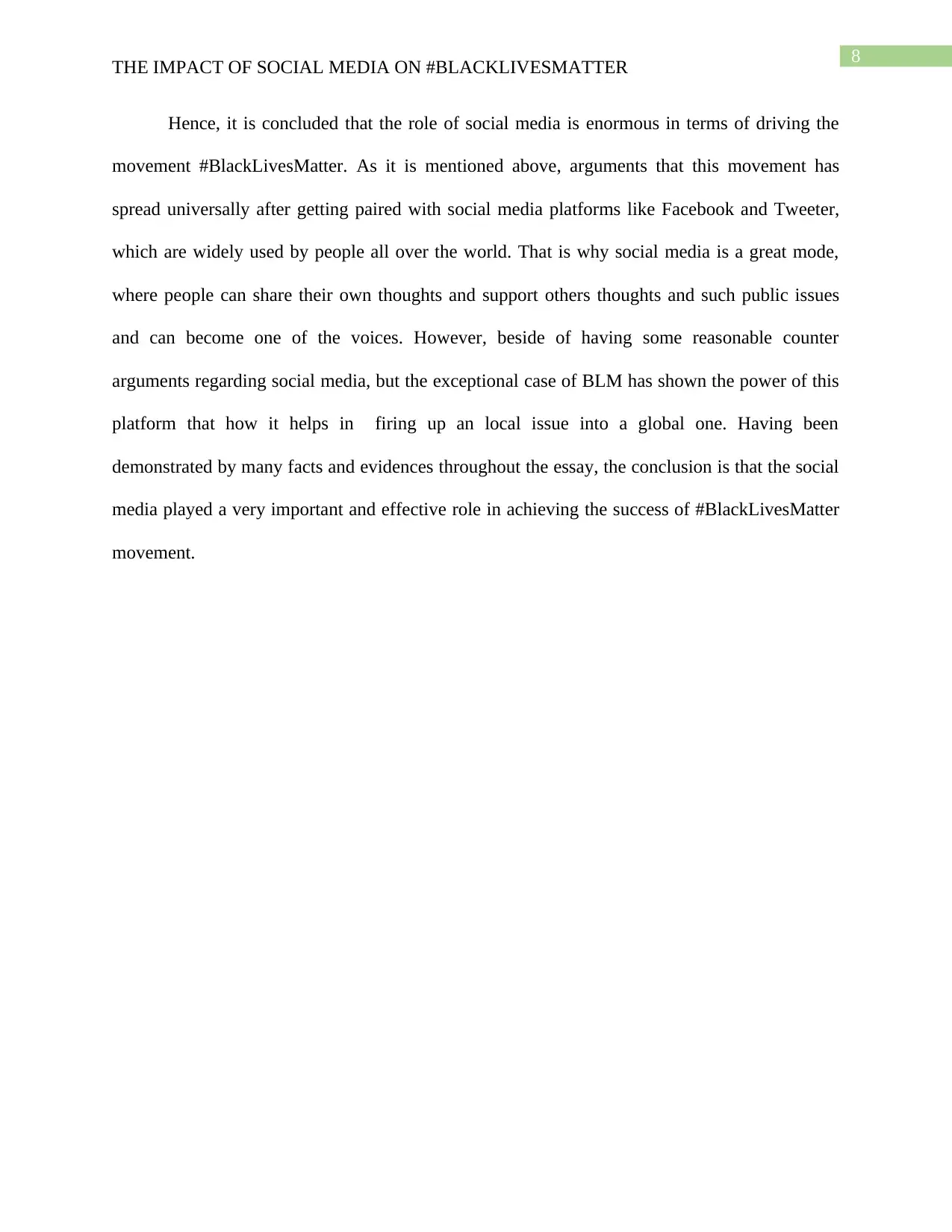
8
THE IMPACT OF SOCIAL MEDIA ON #BLACKLIVESMATTER
Hence, it is concluded that the role of social media is enormous in terms of driving the
movement #BlackLivesMatter. As it is mentioned above, arguments that this movement has
spread universally after getting paired with social media platforms like Facebook and Tweeter,
which are widely used by people all over the world. That is why social media is a great mode,
where people can share their own thoughts and support others thoughts and such public issues
and can become one of the voices. However, beside of having some reasonable counter
arguments regarding social media, but the exceptional case of BLM has shown the power of this
platform that how it helps in firing up an local issue into a global one. Having been
demonstrated by many facts and evidences throughout the essay, the conclusion is that the social
media played a very important and effective role in achieving the success of #BlackLivesMatter
movement.
THE IMPACT OF SOCIAL MEDIA ON #BLACKLIVESMATTER
Hence, it is concluded that the role of social media is enormous in terms of driving the
movement #BlackLivesMatter. As it is mentioned above, arguments that this movement has
spread universally after getting paired with social media platforms like Facebook and Tweeter,
which are widely used by people all over the world. That is why social media is a great mode,
where people can share their own thoughts and support others thoughts and such public issues
and can become one of the voices. However, beside of having some reasonable counter
arguments regarding social media, but the exceptional case of BLM has shown the power of this
platform that how it helps in firing up an local issue into a global one. Having been
demonstrated by many facts and evidences throughout the essay, the conclusion is that the social
media played a very important and effective role in achieving the success of #BlackLivesMatter
movement.
⊘ This is a preview!⊘
Do you want full access?
Subscribe today to unlock all pages.

Trusted by 1+ million students worldwide
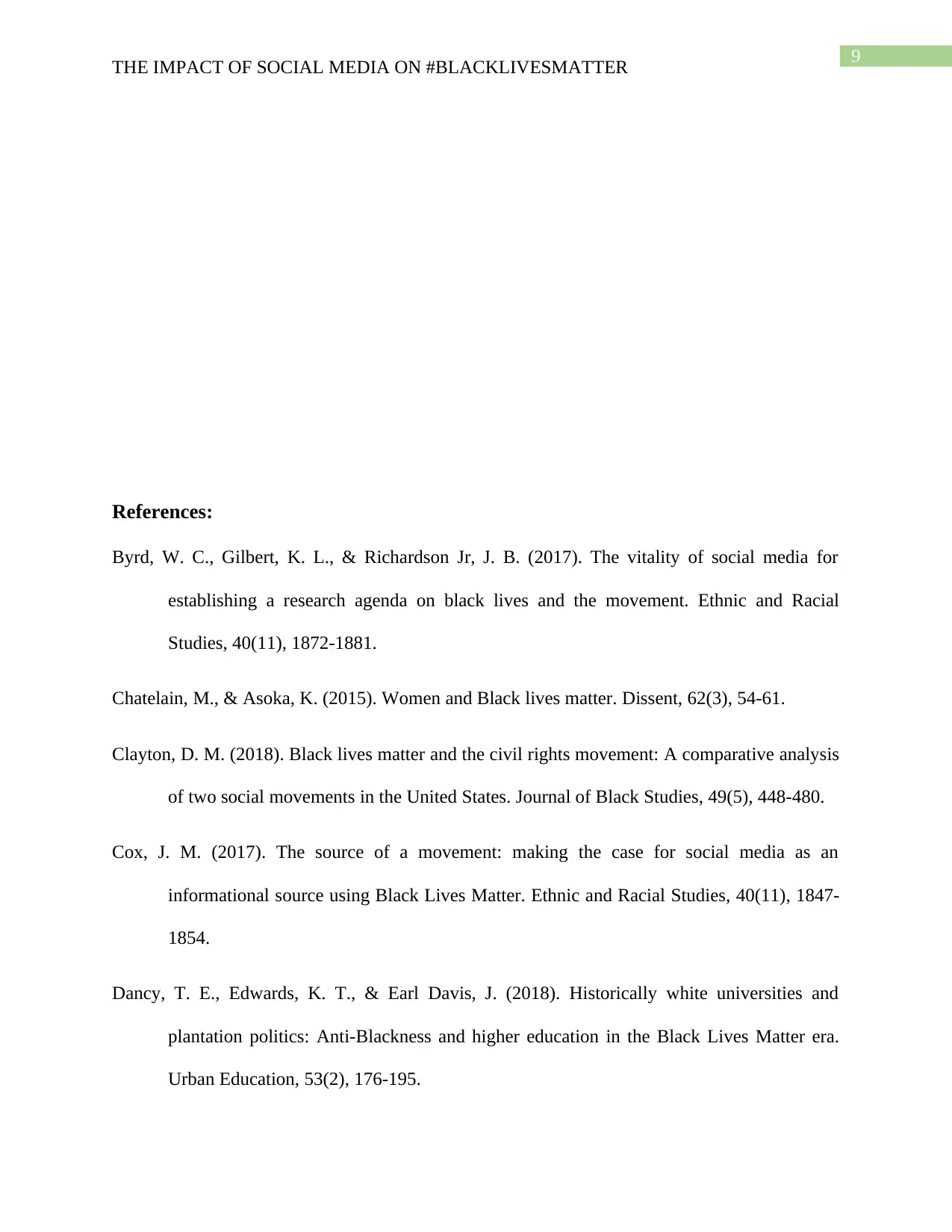
9
THE IMPACT OF SOCIAL MEDIA ON #BLACKLIVESMATTER
References:
Byrd, W. C., Gilbert, K. L., & Richardson Jr, J. B. (2017). The vitality of social media for
establishing a research agenda on black lives and the movement. Ethnic and Racial
Studies, 40(11), 1872-1881.
Chatelain, M., & Asoka, K. (2015). Women and Black lives matter. Dissent, 62(3), 54-61.
Clayton, D. M. (2018). Black lives matter and the civil rights movement: A comparative analysis
of two social movements in the United States. Journal of Black Studies, 49(5), 448-480.
Cox, J. M. (2017). The source of a movement: making the case for social media as an
informational source using Black Lives Matter. Ethnic and Racial Studies, 40(11), 1847-
1854.
Dancy, T. E., Edwards, K. T., & Earl Davis, J. (2018). Historically white universities and
plantation politics: Anti-Blackness and higher education in the Black Lives Matter era.
Urban Education, 53(2), 176-195.
THE IMPACT OF SOCIAL MEDIA ON #BLACKLIVESMATTER
References:
Byrd, W. C., Gilbert, K. L., & Richardson Jr, J. B. (2017). The vitality of social media for
establishing a research agenda on black lives and the movement. Ethnic and Racial
Studies, 40(11), 1872-1881.
Chatelain, M., & Asoka, K. (2015). Women and Black lives matter. Dissent, 62(3), 54-61.
Clayton, D. M. (2018). Black lives matter and the civil rights movement: A comparative analysis
of two social movements in the United States. Journal of Black Studies, 49(5), 448-480.
Cox, J. M. (2017). The source of a movement: making the case for social media as an
informational source using Black Lives Matter. Ethnic and Racial Studies, 40(11), 1847-
1854.
Dancy, T. E., Edwards, K. T., & Earl Davis, J. (2018). Historically white universities and
plantation politics: Anti-Blackness and higher education in the Black Lives Matter era.
Urban Education, 53(2), 176-195.
Paraphrase This Document
Need a fresh take? Get an instant paraphrase of this document with our AI Paraphraser
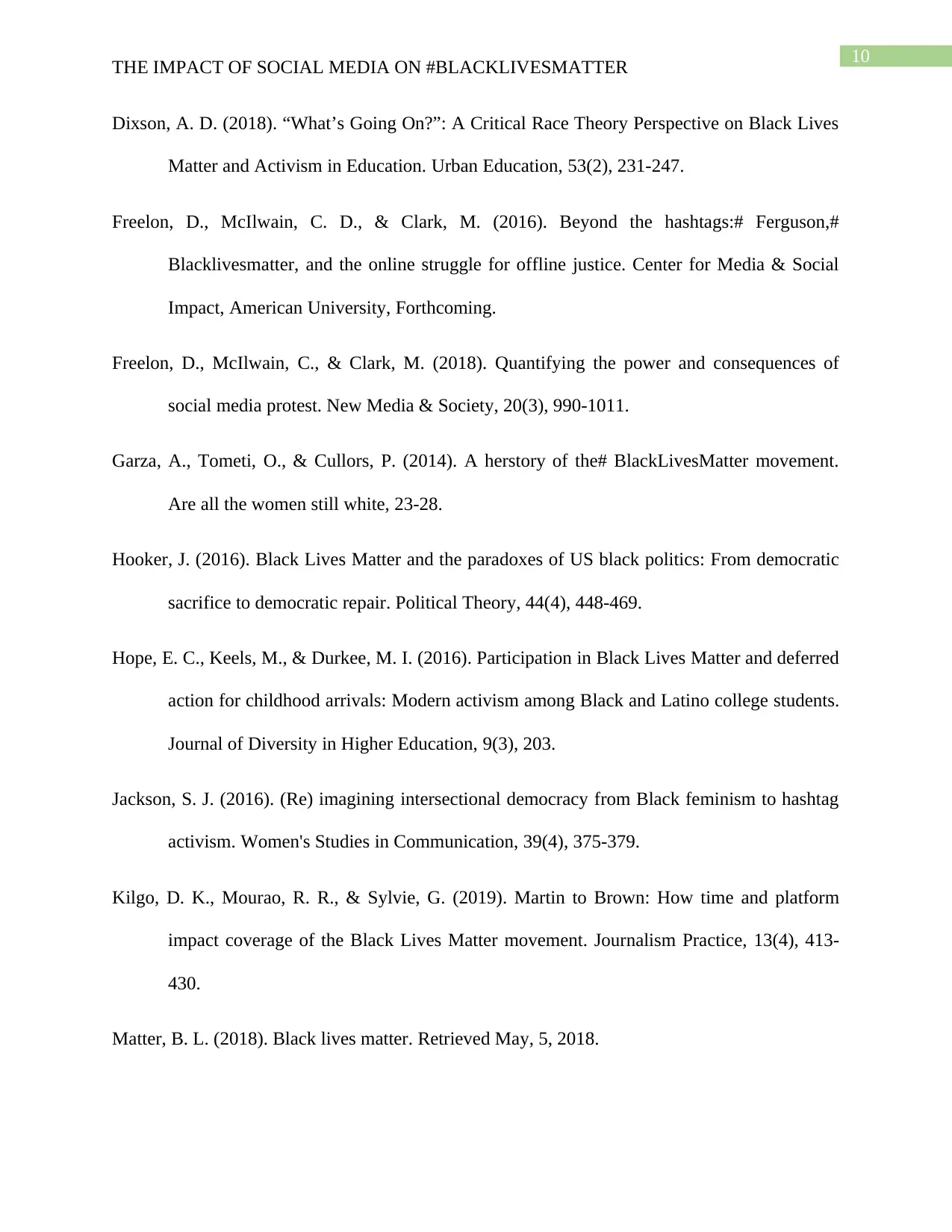
10
THE IMPACT OF SOCIAL MEDIA ON #BLACKLIVESMATTER
Dixson, A. D. (2018). “What’s Going On?”: A Critical Race Theory Perspective on Black Lives
Matter and Activism in Education. Urban Education, 53(2), 231-247.
Freelon, D., McIlwain, C. D., & Clark, M. (2016). Beyond the hashtags:# Ferguson,#
Blacklivesmatter, and the online struggle for offline justice. Center for Media & Social
Impact, American University, Forthcoming.
Freelon, D., McIlwain, C., & Clark, M. (2018). Quantifying the power and consequences of
social media protest. New Media & Society, 20(3), 990-1011.
Garza, A., Tometi, O., & Cullors, P. (2014). A herstory of the# BlackLivesMatter movement.
Are all the women still white, 23-28.
Hooker, J. (2016). Black Lives Matter and the paradoxes of US black politics: From democratic
sacrifice to democratic repair. Political Theory, 44(4), 448-469.
Hope, E. C., Keels, M., & Durkee, M. I. (2016). Participation in Black Lives Matter and deferred
action for childhood arrivals: Modern activism among Black and Latino college students.
Journal of Diversity in Higher Education, 9(3), 203.
Jackson, S. J. (2016). (Re) imagining intersectional democracy from Black feminism to hashtag
activism. Women's Studies in Communication, 39(4), 375-379.
Kilgo, D. K., Mourao, R. R., & Sylvie, G. (2019). Martin to Brown: How time and platform
impact coverage of the Black Lives Matter movement. Journalism Practice, 13(4), 413-
430.
Matter, B. L. (2018). Black lives matter. Retrieved May, 5, 2018.
THE IMPACT OF SOCIAL MEDIA ON #BLACKLIVESMATTER
Dixson, A. D. (2018). “What’s Going On?”: A Critical Race Theory Perspective on Black Lives
Matter and Activism in Education. Urban Education, 53(2), 231-247.
Freelon, D., McIlwain, C. D., & Clark, M. (2016). Beyond the hashtags:# Ferguson,#
Blacklivesmatter, and the online struggle for offline justice. Center for Media & Social
Impact, American University, Forthcoming.
Freelon, D., McIlwain, C., & Clark, M. (2018). Quantifying the power and consequences of
social media protest. New Media & Society, 20(3), 990-1011.
Garza, A., Tometi, O., & Cullors, P. (2014). A herstory of the# BlackLivesMatter movement.
Are all the women still white, 23-28.
Hooker, J. (2016). Black Lives Matter and the paradoxes of US black politics: From democratic
sacrifice to democratic repair. Political Theory, 44(4), 448-469.
Hope, E. C., Keels, M., & Durkee, M. I. (2016). Participation in Black Lives Matter and deferred
action for childhood arrivals: Modern activism among Black and Latino college students.
Journal of Diversity in Higher Education, 9(3), 203.
Jackson, S. J. (2016). (Re) imagining intersectional democracy from Black feminism to hashtag
activism. Women's Studies in Communication, 39(4), 375-379.
Kilgo, D. K., Mourao, R. R., & Sylvie, G. (2019). Martin to Brown: How time and platform
impact coverage of the Black Lives Matter movement. Journalism Practice, 13(4), 413-
430.
Matter, B. L. (2018). Black lives matter. Retrieved May, 5, 2018.
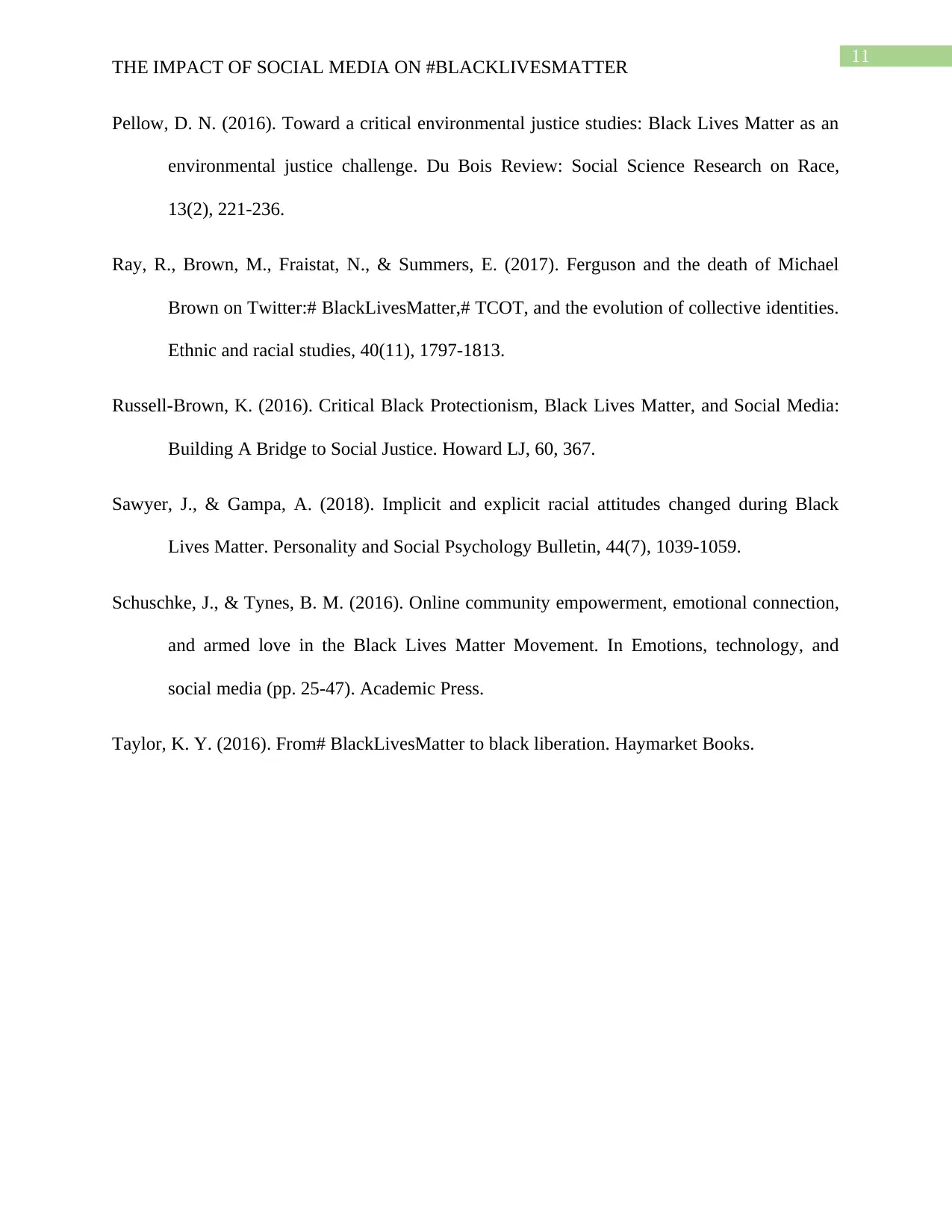
11
THE IMPACT OF SOCIAL MEDIA ON #BLACKLIVESMATTER
Pellow, D. N. (2016). Toward a critical environmental justice studies: Black Lives Matter as an
environmental justice challenge. Du Bois Review: Social Science Research on Race,
13(2), 221-236.
Ray, R., Brown, M., Fraistat, N., & Summers, E. (2017). Ferguson and the death of Michael
Brown on Twitter:# BlackLivesMatter,# TCOT, and the evolution of collective identities.
Ethnic and racial studies, 40(11), 1797-1813.
Russell-Brown, K. (2016). Critical Black Protectionism, Black Lives Matter, and Social Media:
Building A Bridge to Social Justice. Howard LJ, 60, 367.
Sawyer, J., & Gampa, A. (2018). Implicit and explicit racial attitudes changed during Black
Lives Matter. Personality and Social Psychology Bulletin, 44(7), 1039-1059.
Schuschke, J., & Tynes, B. M. (2016). Online community empowerment, emotional connection,
and armed love in the Black Lives Matter Movement. In Emotions, technology, and
social media (pp. 25-47). Academic Press.
Taylor, K. Y. (2016). From# BlackLivesMatter to black liberation. Haymarket Books.
THE IMPACT OF SOCIAL MEDIA ON #BLACKLIVESMATTER
Pellow, D. N. (2016). Toward a critical environmental justice studies: Black Lives Matter as an
environmental justice challenge. Du Bois Review: Social Science Research on Race,
13(2), 221-236.
Ray, R., Brown, M., Fraistat, N., & Summers, E. (2017). Ferguson and the death of Michael
Brown on Twitter:# BlackLivesMatter,# TCOT, and the evolution of collective identities.
Ethnic and racial studies, 40(11), 1797-1813.
Russell-Brown, K. (2016). Critical Black Protectionism, Black Lives Matter, and Social Media:
Building A Bridge to Social Justice. Howard LJ, 60, 367.
Sawyer, J., & Gampa, A. (2018). Implicit and explicit racial attitudes changed during Black
Lives Matter. Personality and Social Psychology Bulletin, 44(7), 1039-1059.
Schuschke, J., & Tynes, B. M. (2016). Online community empowerment, emotional connection,
and armed love in the Black Lives Matter Movement. In Emotions, technology, and
social media (pp. 25-47). Academic Press.
Taylor, K. Y. (2016). From# BlackLivesMatter to black liberation. Haymarket Books.
⊘ This is a preview!⊘
Do you want full access?
Subscribe today to unlock all pages.

Trusted by 1+ million students worldwide
1 out of 12
Related Documents
Your All-in-One AI-Powered Toolkit for Academic Success.
+13062052269
info@desklib.com
Available 24*7 on WhatsApp / Email
![[object Object]](/_next/static/media/star-bottom.7253800d.svg)
Unlock your academic potential
Copyright © 2020–2026 A2Z Services. All Rights Reserved. Developed and managed by ZUCOL.





